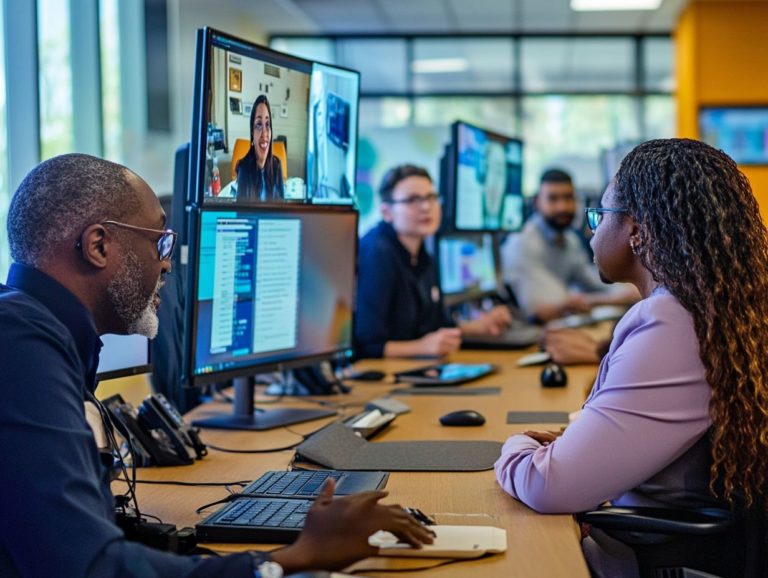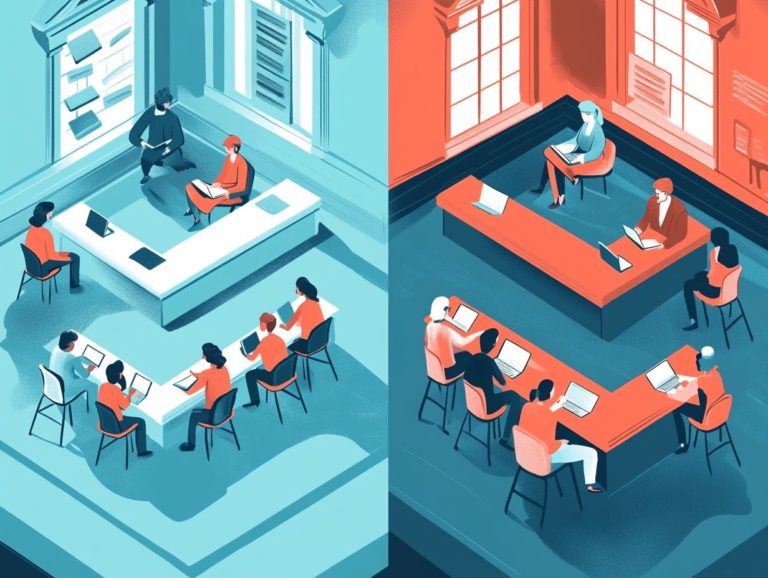Online Bachelor’s Degrees vs. Traditional Degrees: Pros and Cons
In today s swiftly changing educational landscape, you find yourself at a crossroads, deciding between an online and a traditional bachelor s degree an important choice many students face.
Each path presents its own set of benefits and challenges that can profoundly influence your learning experience and career trajectory. This article delves into the key differences, examining the flexibility and cost-effectiveness of online degrees against the hands-on learning and networking opportunities inherent in traditional settings.
By weighing the pros and cons of both options, you can make an informed decision that aligns perfectly with your personal and professional aspirations.
Contents
- Key Takeaways:
- Overview of Online and Traditional Degrees
- Pros of Online Bachelor’s Degrees
- Cons of Online Bachelor’s Degrees
- Pros of Traditional Bachelor’s Degrees
- Cons of Traditional Bachelor’s Degrees
- Which Type of Degree is Right for You?
- Frequently Asked Questions
- What are the main differences between online bachelor s degrees and traditional degrees?
- What are the pros of pursuing an online bachelor s degree?
- What are the cons of pursuing an online bachelor s degree?
- What are the benefits of pursuing a traditional bachelor s degree?
- What are the drawbacks of pursuing a traditional bachelor s degree?
- Can I mix and match online and traditional courses for my bachelor s degree?
Key Takeaways:
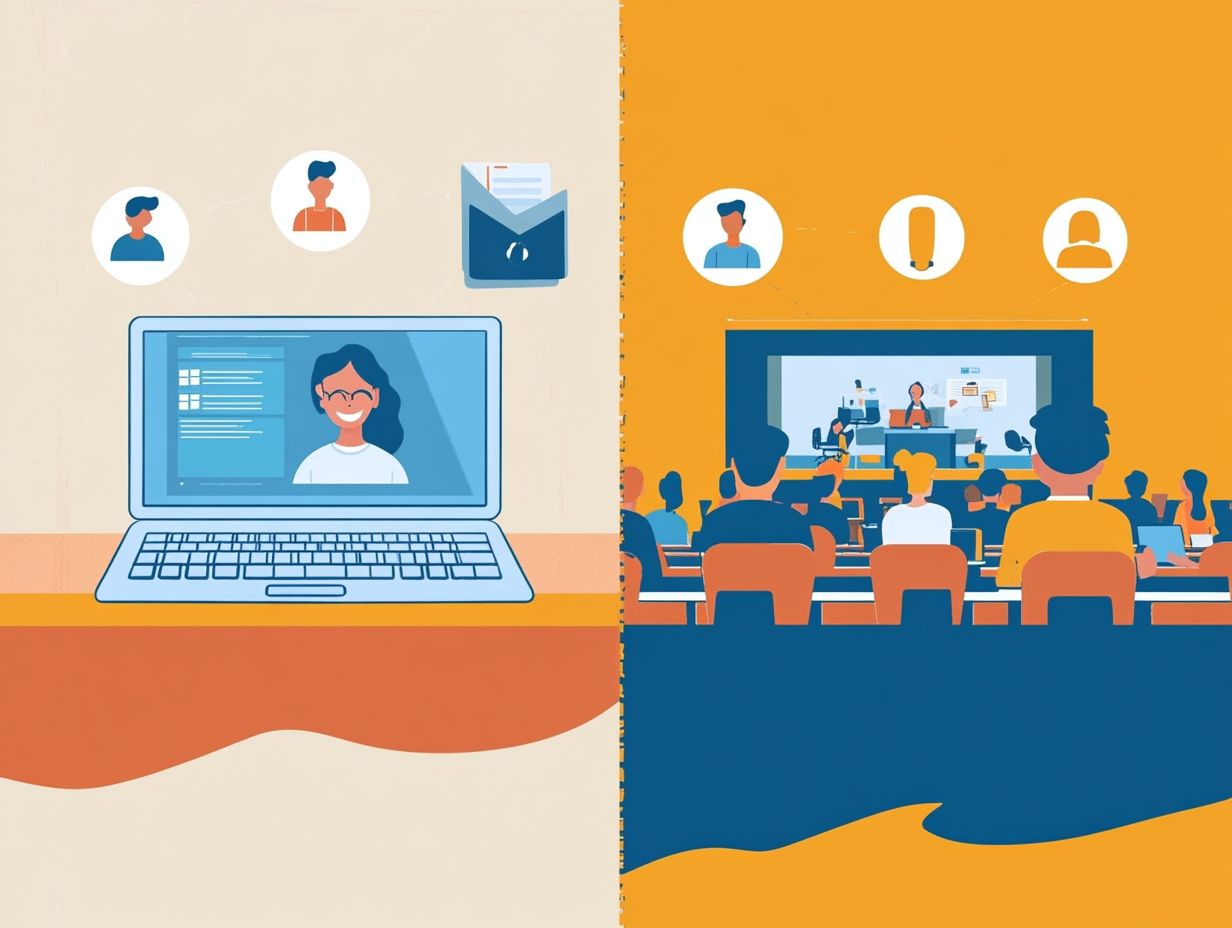
Online bachelor’s degrees offer flexibility and cost savings, but it’s important to weigh the pros and cons of dual enrollment online bachelor’s degrees. Traditional degrees provide hands-on experience and networking opportunities.
However, online degrees may lack in-person learning and social interaction, while traditional degrees often come with higher costs and less flexibility.
Consider your learning style, career goals, and personal needs when deciding between online and traditional degrees. Both have pros and cons, so choose the option that best suits you.
Overview of Online and Traditional Degrees
Higher education has changed a lot, presenting you with many options for pursuing your degree, from online programs to traditional university experiences.
Each pathway has its own advantages and challenges, shaping your academic performance, career trajectory, and personal development.
As the demand for flexibility and convenience grows, you may find yourself torn between the immersive environment of traditional institutions and the accessibility that online learning offers.
Understanding these distinctions is vital as you chart your educational journey. This ensures that you make informed choices that align with your goals and aspirations.
Understanding the Differences
It is crucial for you, as a prospective student, to understand the differences between online classes and on-campus programs. These choices can significantly shape your educational experience and outcomes.
Choosing online education can improve how well you remember what you learn because of the flexibility it provides. This allows you to balance your studies with personal and professional commitments.
You ll find that learning outcomes often improve when you engage with innovative technological tools that create interactive and personalized learning experiences.
Cultural diversity enriches discussions and broadens perspectives. Virtual classrooms help overcome geographical barriers, connecting you with students from various backgrounds for collaboration.
Embracing these factors enhances your learning journey and equips you for success in a globalized workforce.
Pros of Online Bachelor’s Degrees
Online bachelor’s degrees offer numerous advantages tailored to today s evolving learning landscape. They provide the flexibility and convenience you need while juggling work, family, and academic aspirations.
As a popular choice among degree seekers, these programs create a clear pathway for you to achieve your educational goals. They seamlessly fit into your unique schedule and lifestyle.
This flexibility is enhanced by the affordability of many online offerings, enabling you to reduce the hidden costs often tied to traditional university experiences.
The technological benefits of online education promote independent learning and sharpen your time management skills. This makes it an appealing option for those who seek both convenience and quality.
Take a moment to think about your educational journey what path excites you the most?
Flexibility and Convenience
One of the great benefits of pursuing an online bachelor’s degree is the flexibility and convenience it provides, allowing you to customize your education around your personal and professional commitments. This adaptability accommodates various lifestyles and creates a more personalized learning experience for you.
You have the freedom to choose from a variety of scheduling options whether you prefer early morning classes, evening sessions, or even weekend courses. The online format allows you to engage with course materials from virtually anywhere, whether it s a bustling caf , a quiet home office, or even while you’re on the move.
This level of autonomy enhances your independent learning opportunities, giving you the power to take charge of your education. As a result, many students feel more confident in their studies, realizing they can effectively juggle their academic responsibilities with other commitments.
Cost Savings
The cost savings associated with online bachelor’s degrees are remarkable, as they often eliminate many hidden expenses typically found in traditional university settings.
By cutting out the need for commuting, you can dodge costs related to gas, public transportation fees, and vehicle maintenance. Without a physical campus, you ll benefit from reduced housing expenses, giving you the flexibility to live at home or choose more affordable living arrangements.
Course materials and resources are often cheaper, with many institutions offering digital textbooks and online resources at no extra charge. These savings make online education a smarter choice, potentially leading to higher degree completion rates. You won t be weighed down by overwhelming debt, allowing you to better balance your studies with work or family commitments.
Cons of Online Bachelor’s Degrees
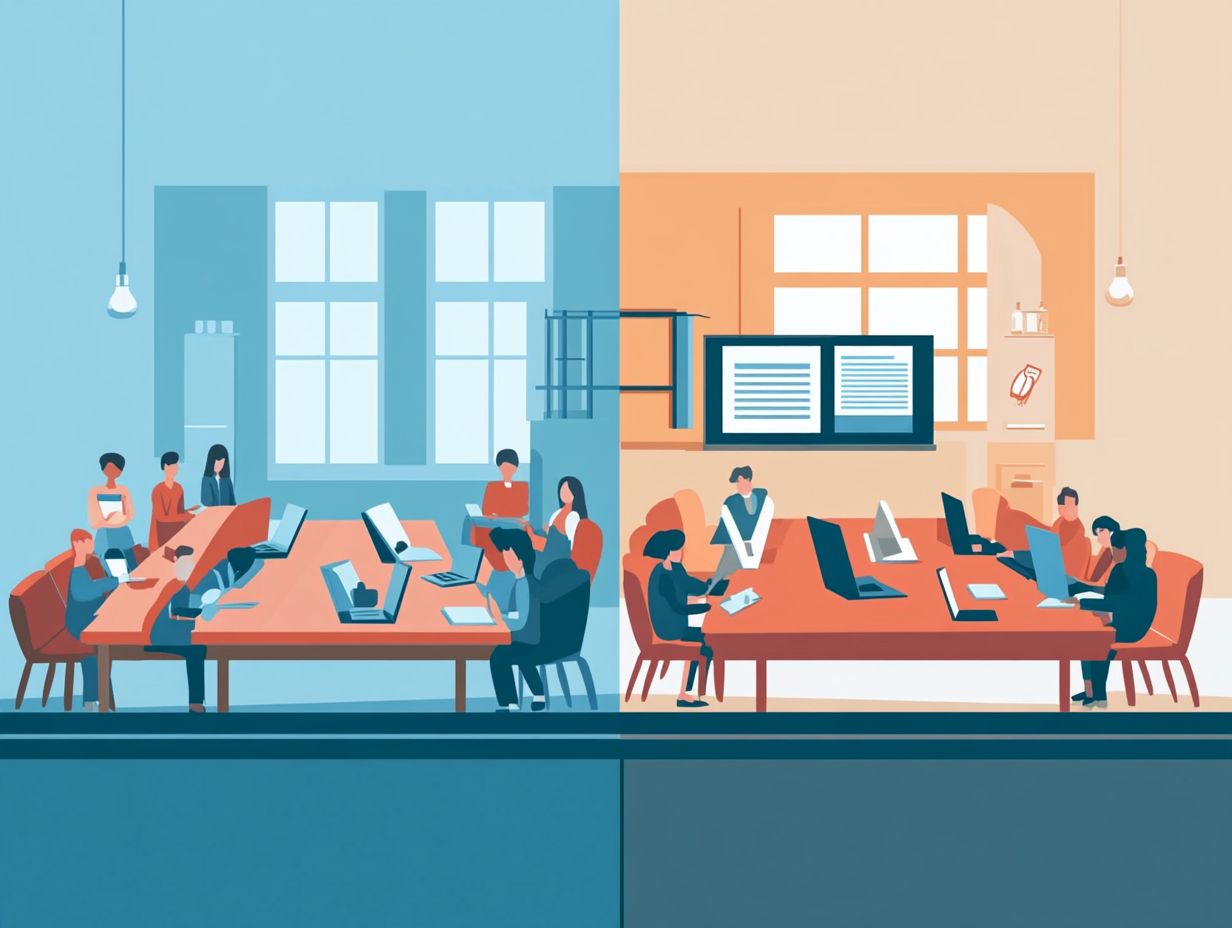
While online bachelor’s degrees present an array of advantages, it’s important to consider the impact of online education on traditional bachelor’s degrees as they also entail specific challenges before reaching your decision.
Potential Lack of Practical Experience
One significant drawback of pursuing an online bachelor’s degree is the potential absence of practical experience that traditional programs often deliver. This gap can be particularly pronounced in fields like healthcare, engineering, and the arts, where hands-on skills are essential for success.
Online programs make commendable efforts to bridge this divide through innovative solutions such as virtual simulations and alternative assessments. However, they may struggle to fully replicate the enriching in-person learning experience.
Take nursing, for example. Sure, virtual patient interactions can be beneficial, but they can’t replace the invaluable real-life clinical rotations that cultivate essential bedside manners. Similarly, engineering students might engage with sophisticated simulation software, yet nothing can truly substitute for working with real machinery.
Thus, even as online education continues to evolve and adapt, a significant challenge persists: ensuring that students in these vital fields receive adequate training necessary to prepare them for their future careers.
Less Social Interaction
You may worry that online bachelor s degrees limit your social interaction, which can impact your networking potential and connections with both peers and instructors.
This lack of face-to-face engagement can make it difficult to forge meaningful professional relationships, posing challenges in building a robust network that could be invaluable for your future career pursuits. In a rapidly evolving job market, connecting with industry professionals and fellow students can greatly influence your employment prospects.
However, as an online learner, you have several strategies at your disposal to overcome geographic limitations:
- Join virtual study groups
- Engage in discussion forums
- Attend webinars
These activities are excellent for cultivating relationships. Additionally, leveraging social media platforms to network and actively joining online communities relevant to your field can further enhance your connections, effectively bridging the gap that the online format may impose.
Start your online education journey today and experience the benefits firsthand!
Pros of Traditional Bachelor’s Degrees
Traditional bachelor’s degrees provide a wealth of advantages that cater to your desire for immersive educational experiences. They allow for in-person learning and create invaluable networking opportunities within your chosen field of study.
Engaging directly with faculty and peers helps you cultivate relationships that can significantly enhance your professional journey.
In-Person Learning and Hands-On Experience
This hands-on approach is especially useful in fields like nursing and engineering, where practical experience is essential. By interacting with faculty who bring real-world expertise and collaborating with fellow students on projects, you can refine your skills more effectively.
Such environments not only enhance your knowledge retention but also build your confidence, as you engage in discussions and troubleshoot challenges together. The synergy generated through these interactions shapes your learning outcomes, giving you the power to develop competencies that are immediately applicable in your future career.
Networking Opportunities
Networking opportunities in traditional bachelor s degree programs offer essential connections that can profoundly influence your career trajectory. Imagine the connections you can make while studying!
These connections are crucial for securing job placements and facilitating long-term career advancement. By nurturing relationships with faculty, industry professionals, and fellow students, you gain invaluable insights and mentorship that can shape your career path.
The career services at these institutions play a key role in guiding you toward internships and job placements, enriching your academic experience and preparing you for the competitive job market ahead.
Cons of Traditional Bachelor’s Degrees
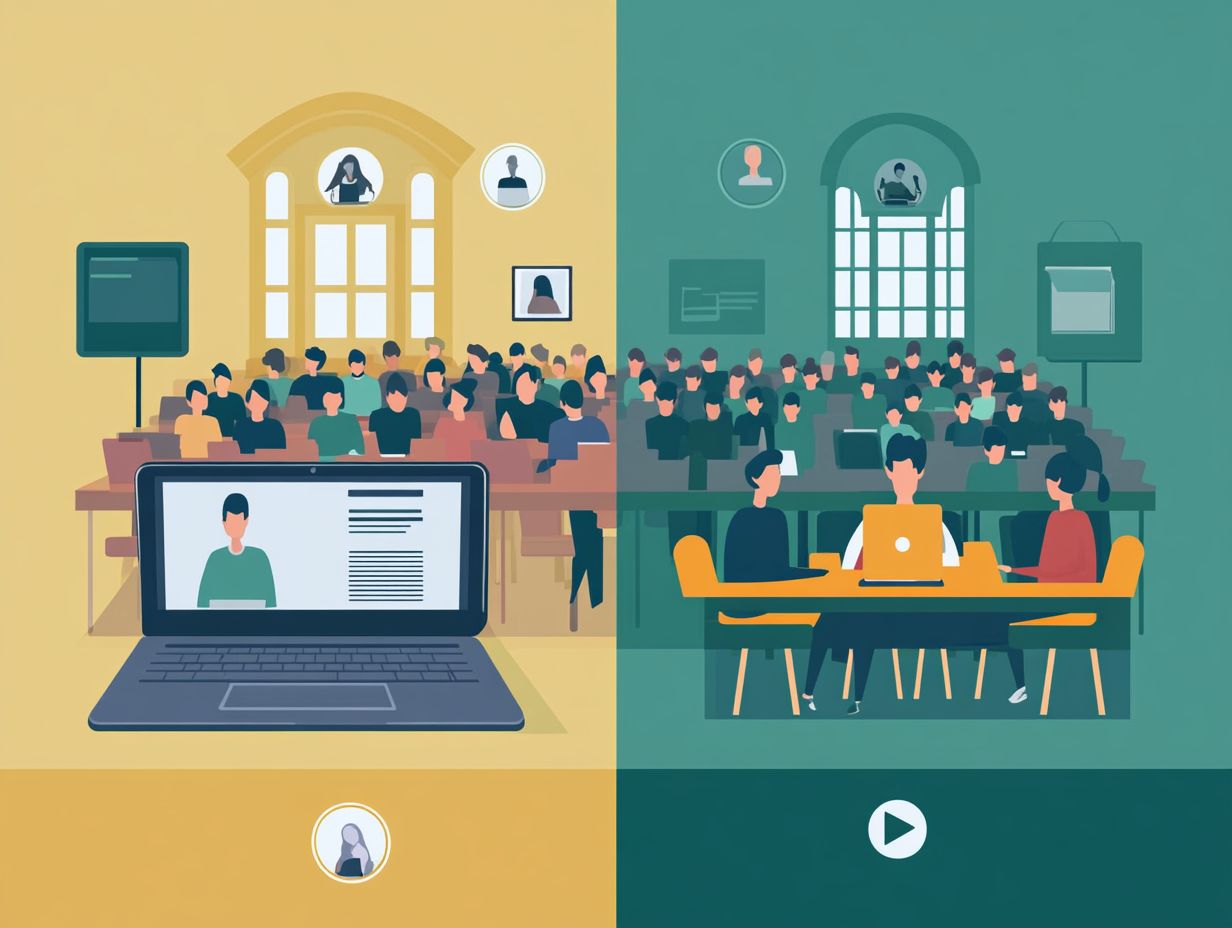
Despite their advantages, traditional bachelor’s degrees can come with notable drawbacks. You may face higher costs and substantial time commitments, especially when considering online vs. traditional accredited universities, creating challenges during your educational journey.
Higher Cost and Time Commitment
One of the most significant drawbacks of traditional bachelor’s degrees is the hefty price tag that comes with tuition, fees, and additional expenses. This financial burden can weigh heavily on you, prompting a reevaluation of your educational options or the accumulation of daunting debt.
The total cost of attendance goes beyond academic fees; it includes living expenses that can force you into tough financial decisions, potentially impacting your overall career trajectory.
Juggling academics with the need to work part-time complicates matters, making time management an essential skill. The demands of a traditional program can strain your work-life balance, leading to stress and possible burnout, which could ultimately affect both your academic performance and personal well-being.
Less Flexibility for Working Students
Traditional bachelor’s degree programs can often feel restrictive for working students, lacking the flexibility that online alternatives provide. This rigidity can weigh heavily on you as you juggle family, work, and academics.
You may find yourself overwhelmed, attending classes that clash with your work schedule or family commitments. This situation frequently results in stress, burnout, and delays in reaching your educational goals.
To help navigate these challenges, some institutions are embracing hybrid courses, blending online and in-person learning. This approach offers greater flexibility in scheduling, fostering a more manageable balance as you strive to enhance your education while meeting other essential responsibilities.
Consider all factors carefully as you choose your educational path!
Which Type of Degree is Right for You?
Choosing between an online degree and a traditional bachelor’s degree can feel like navigating a complex maze. It is essential to weigh various factors, including those highlighted in the online vs. traditional doctoral degrees comparison, that resonate with your goals.
Take a moment to think about what you truly want for your future!
Factors to Consider
When evaluating which type of degree is right for you, several important factors come into play. Consider the nature of the degree program and how much personal attention you ll need.
Understanding how you learn best is crucial. Today s job market changes quickly. If you thrive in collaborative environments, you might benefit significantly from the personal interaction typically offered at traditional universities.
If you re an independent learner, online programs that provide flexibility and allow you to learn at your own speed could be your sweet spot. It is also vital to think about how employers view these pathways. Some may still favor traditional degrees, while others recognize the value of online education.
Reflecting on your career aspirations and personal needs will help you navigate which educational experience aligns best with your future goals.
Frequently Asked Questions
What are the main differences between online bachelor s degrees and traditional degrees?
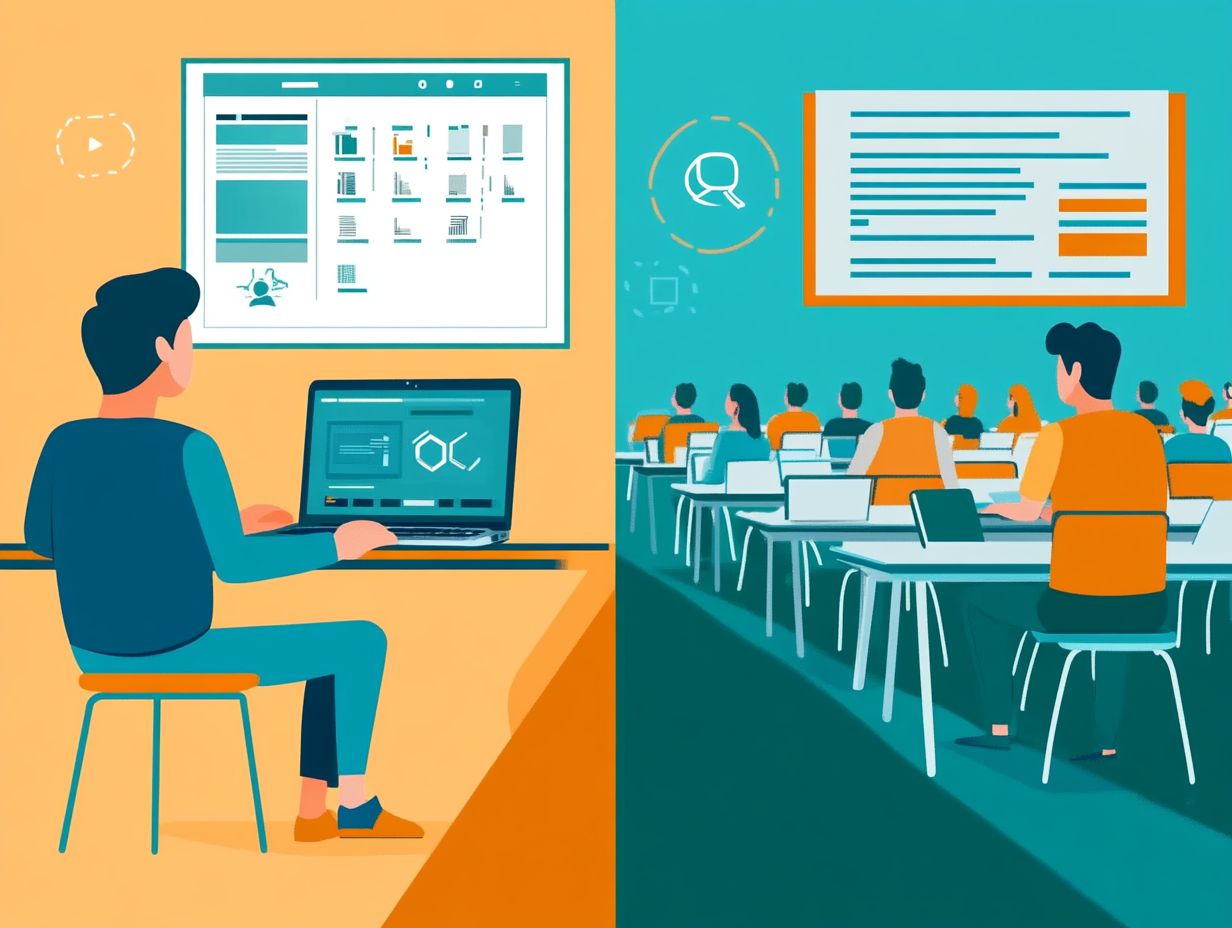
Online bachelor’s degrees are completed entirely online, while traditional degrees require in-person attendance at a physical campus. Online degrees typically offer more flexibility in terms of scheduling and location. However, it’s important to consider the pros and cons of a fast-track online master’s, as traditional degrees provide more opportunities for face-to-face interaction and hands-on learning experiences.
What are the pros of pursuing an online bachelor s degree?
The main advantage of earning an online bachelor s degree is the flexibility it provides. Students can complete coursework at their own pace and on their own schedule. Online degrees often have lower tuition costs and allow students to continue working while pursuing their education.
What are the cons of pursuing an online bachelor s degree?
One potential downside of online degrees is the lack of in-person interaction and hands-on learning experiences. This can be a challenge for some students who thrive in a traditional classroom setting. Online degrees require strong self-motivation and time-management skills.
What are the benefits of pursuing a traditional bachelor s degree?
Traditional degrees offer opportunities for in-person interaction with professors and classmates, enhancing the learning experience. They also often provide hands-on learning opportunities, such as labs and internships. Traditional degrees hold a certain level of prestige and recognition in the job market.
What are the drawbacks of pursuing a traditional bachelor s degree?
The main disadvantage of traditional degrees is the rigid schedule and location requirements. This can be challenging for students with work or family commitments. Traditional degrees can also be more expensive, both in terms of tuition and the cost of living on or near campus.
Can I mix and match online and traditional courses for my bachelor s degree?
Yes, many universities offer a mix of online and traditional courses for students to complete their bachelor s degree. This allows students to take advantage of the flexibility of online courses while still participating in in-person classes and experiences. However, it depends on the specific program and university, so be sure to research your options.
What are your thoughts on online learning?

